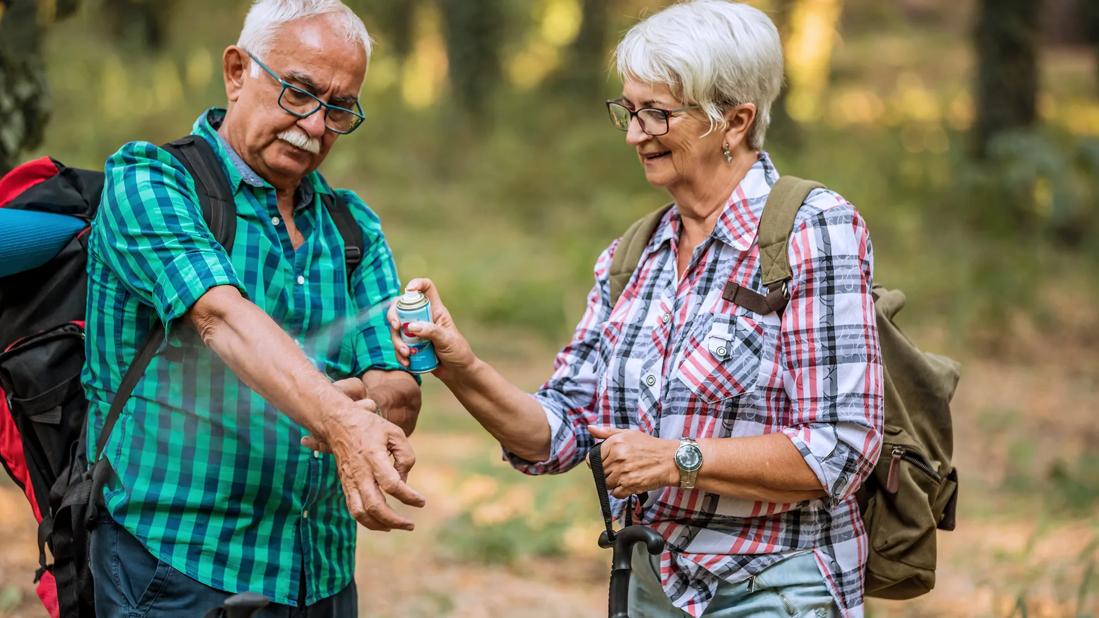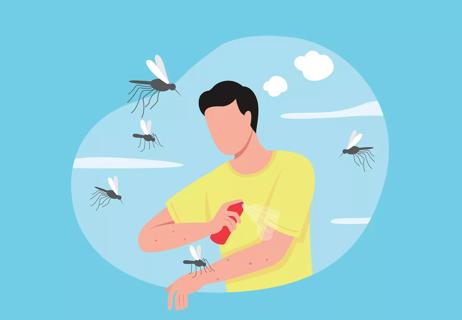Using insect repellent, covering up and keeping your property dry can help keep the buggers at bay

Blood-thirsty creatures live amongst us — and odds are, one of those pesky mosquitoes will feast on you sometime soon.
Advertisement
Cleveland Clinic is a non-profit academic medical center. Advertising on our site helps support our mission. We do not endorse non-Cleveland Clinic products or services. Policy
But that doesn’t mean you should serve yourself up on a platter to those little suckers. There are ways to prevent mosquito bites and the oh-so-itchy welts they leave behind, as dermatologist Melissa Piliang, MD, explains.
If you want to 100% avoid getting bitten by a mosquito, pack up your belongings and move to Antarctica or Iceland. Those are the only two places on Earth known to be completely mosquito-free.
But as that’s probably not a viable option for many folks, Dr. Piliang offers these 10 tips to keep those biting bugs at bay.
Used as directed, insect repellent is the best way to protect yourself from mosquito bites when you’re outside for extended periods. It's safe for kids and even recommended during pregnancy.
When choosing insect repellent to apply to your skin, look for the active ingredients DEET (N, N-diethyl-m-toluamide) or picaridin (KBR 3023). Both protect against biting skeeters and other insects.
Dr. Piliang recommends DEET, the most common ingredient found in insect repellents.
“Higher concentrations of DEET give you longer-lasting protection if you’re staying outside for several hours,” she says. “Products with DEET typically offer different formulas that contain from 5% to 100% of the chemical, giving you about 90 minutes to 10 hours of protection.”
Advertisement
Be sure to follow the directions on the package and follow these tips:
One other bit of advice: Once you’re inside for the day, wash off the insect repellent.
A mosquito’s first choice for biting is to target bare, unprotected skin. Covering up with clothing such as a loose-fitting long-sleeve shirt or pants creates a physical barrier that makes it less likely you’ll be bitten.
“Less likely” doesn’t mean impossible, though: A hungry mosquito’s needle-like proboscis can jab through clothing, including heavier material like jeans. They’re just less apt to try.
If you want to maximize protection from your outfit, purchase clothing treated with a synthetic insect repellent called permethrin. Factory-treated clothing will be marked with a pesticide use label.
You can also treat clothes on your own using a permethrin spray readily available online and at retailers that cater to outdoor activities. If treating gear yourself, follow the instructions carefully. Don’t apply permethrin products directly to your skin.
Treated items retain their protection through multiple wash-and-dry cycles. Follow manufacturer instructions for laundering.
While mosquitoes can be flying around at any time, they’re most active from dusk till dawn. It’s especially important to take protective action (such as using insect repellent and covering up) during those hours of the day.
And if the bugs are REALLY biting during a certain period, consider hanging inside for a bit.
Standing water can turn your backyard into a mosquito breeding ground. “Mosquitoes lay their eggs in standing water, so drain any standing water on your property and empty anything that collects water,” advises Dr. Piliang.
Any kind of container can become a hotbed for mosquitoes, so drain and dry out items like:
Advertisement
Sweat is a good thing when it comes to regulating body temperature, but it also serves as a beacon for biting bugs. “Mosquitoes are attracted to substances [especially lactic acid] that our bodies release when we sweat,” Dr. Piliang explains.
That makes your sweat-slickened skin extra-tasty for mosquitoes when you’re mowing the lawn, running a few miles or doing any other outdoor activity that leaves your shirt sticking to your back.
Drying off from time to time will help keep the mosquitoes away. Don’t delay on hitting the showers when you’re done for the day either.
You may love fruity, floral or woodsy scents, but here’s some bad news: Bugs do, too.
“Mosquitoes are attracted to perfumes, colognes and even scented lotions,” says Dr. Piliang. “If you’re prone to getting bitten, it’s best to forego fragrances.”
Don’t let mosquitoes make your home their home. Keep windows and doors closed or make sure you have intact screens in place so the breeze can come in without carrying any winged visitors.
“Keep the bugs outside where they belong,” says Dr. Piliang.
There’s nothing like sleeping on a porch or under the moon and stars on a nice night. But if you’re going to sleep al fresco style, a mosquito bed net can let you rest easy without worries of becoming a bug buffet.
Advertisement
Bed nets are fine mesh curtains that hang over sleeping areas to keep bugs out while letting the cool air in. Some nets are even pretreated with insecticide, which has been shown to increase their effectiveness by as much as 70%.
Netting can also be used over baby strollers and carriers to help protect little ones from getting eaten up.
Mosquitoes aren’t particularly mobile, especially when they have to contend with windy conditions. A running fan may provide just enough air movement to keep those buggers away from you.
It’s no secret that bugs love trash. Spraying an insecticide in your garbage may limit the population of mosquitoes, as well as other flying and crawling insects. Make sure to always keep the lid on tight, too.
Nobody wants to deal with the itchy aftereffects of a mosquito bite, but there are far more serious consequences that can come from a bite.
Mosquito bites can become infected, trigger an allergic reaction or bring on an illness.
“Though not as common in the U.S. as in other parts of the world, infected mosquitoes carry diseases that can be deadly, including malaria, Zika virus, West Nile virus and more,” warns Dr. Piliang.
All the more reason to keep those bugs as far away from you as possible.
Advertisement
Learn more about our editorial process.
Advertisement

Keep ‘mozzies’ at bay by avoiding scented body products, beer and certain colored clothes

Vanilla extract won’t keep mosquitoes away for long, if at all — and could even attract other bugs, like wasps or flies

Alpha-gal syndrome has become more common and is a leading cause of anaphylaxis

These red, raised bites often show up in a zigzag pattern on areas of your skin that come into contact with bedding

Twice daily tick checks, the right bug sprays and long pants can help you prevent tick-borne diseases

Bug bites create tiny openings in your skin that can let in dangerous bacteria

Kissing bugs are insects that can carry a dangerous parasite that causes Chagas disease

Whether you scrape or pull out the stinger, the key is to do it quickly

Wearing a scarf, adjusting your outdoor activities and following your asthma treatment plan can help limit breathing problems

Your diet in the weeks, days and hours ahead of your race can power you to the finish line

When someone guilt trips you, they’re using emotionally manipulative behavior to try to get you to act a certain way